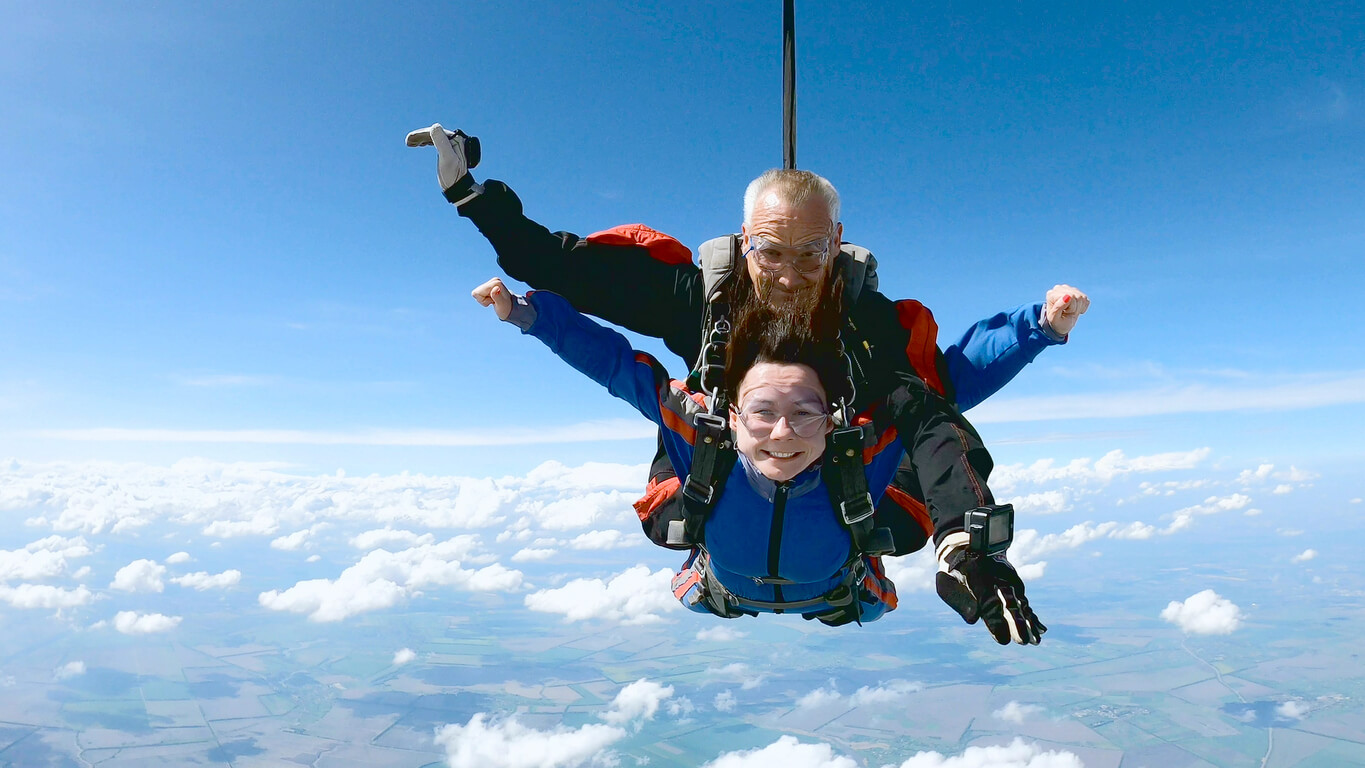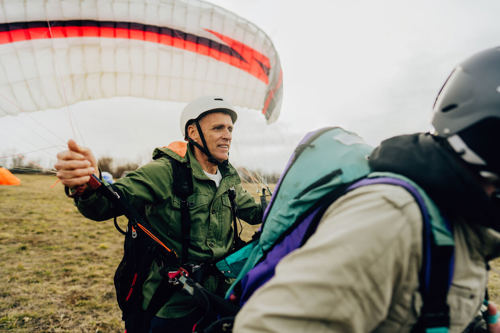What is the average skydiving instructor salary?
24 June 2025

While the exact number of skydiving instructors in the UK is difficult to track, it’s fair to say it’s a pretty niche career choice. That said, it can be an incredibly rewarding one for those who decide to pursue it.
If you’re a skydiving instructor, you may be wondering how your salary compares to others in the industry and whether your earnings are fair for the work you do. After all, it’s a high-risk job that takes a lot of skill (and bravery) to master, so you want to ensure that your income reflects that.
Whatever your situation—whether skydiving is just a hobby or your full-time career—knowing how much you could or should be earning is important.
So, how much do skydiving instructors earn in the UK, and what factors can influence a skydiving instructor salary?
What type of skydiving instructor are you?
Although skydiving might seem a fairly straightforward discipline to outsiders or those with little knowledge of it, there are various forms of skydiving, each with its own individual levels of skill and intricacy.
Here are some of the most common forms of skydiving and skydiving instructors you’re likely to encounter.
Tandem instructors
These are experienced, qualified skydiving professionals who take complete beginners and first-timers on a skydive while attached via a harness.
If you’ve ever done a charity skydive, the chances are you did it with a tandem instructor. According to Glassdoor, the average tandem skydiving instructor salary in the UK is around £27k.
AFF instructors (Accelerated Freefall)
AFF instructors teach the Accelerated Freefall progression. This is when students jump solo with instructors holding onto them in freefall.
These instructors need a higher licence grade than tandem instructors (more on licences later) and so are more experienced. AFF instructors could expect to earn up to around £32k.
Skydiving coach
Skydiving coaches work with licensed or student skydivers to teach skill progression and development. Coaches tend to be the lowest paid of all types on this list, with annual pay typically ranging from £15-21k.
Skydiving examiner
The primary role of a skydiving examiner is to train and certify other skydiving instructors. Examiners could expect to earn a salary of around £30k.
Specialist skydiving
As we mentioned above, there are various types of skydiving, such as indoor skydiving, wingsuit diving and canopy piloting, for which you can also train to become an instructor. Salaries and pay ranges may vary depending on the type of skydiving you teach, so it’s worth doing your own research if there’s a specific type you’re particularly interested in.
Please note that the figures quoted above are merely averages. Some skydiving instructors may also be paid hourly or per jump, rather than salaried.
Your skydiving experience
Skydiving instructor salaries can vary depending on your experience level, with earning potential increasing as you become more experienced.
A newly qualified instructor may start on a salary between £15-21k, but this could quickly rise to £30-40k+ with experience.
You’ll also have a lot more control over your salary if you run your own skydiving business or are freelance rather than working as an employee for an organisation.
Seasonality
The skydiving industry is massively impacted by seasonality, which in turn can impact the earning potential of instructors.
Peak skydiving season typically kicks off in April and runs until around the end of September or the start of October. Skydiving is generally more popular throughout these months, so instructors can expect to make the bulk of their annual income during this time.
November to March is widely considered the ‘low-season’ in the skydiving world. Bookings tend to slow down for the winter months, and many UK drop zones (DZs) close entirely until reopening again in the spring. You can use the British Skydiving interactive map to find your nearest official drop zone.
The low-season can be challenging, especially if you’re freelance, so you should consider this carefully if you’re thinking about a career change.
However, being freelance and not necessarily being tied to one employer or place means you have the freedom to travel to capitalise on warmer weather and peak seasons elsewhere. For example, skydiving instructors may find there are more opportunities to top up their earnings in warmer countries like Spain or Portugal throughout the traditional winter months.
This leads us nicely to our next point…
Location
Location can also heavily influence a skydiving instructor’s salary.
In the UK, if you’re near large and densely-populated cities like London, Birmingham, or Manchester, a higher volume of interest may mean instructors paid per jump can earn more.
Instructors living in more remote or rural areas, where the appetite for skydiving may be lower, may find their earnings are also lower as a result.
As we mentioned earlier, skydiving instructors who are more willing to travel during the off-season may reap the rewards for doing so. Countries that aren’t as negatively impacted by winter weather may be the ideal spot for instructors looking to earn a living all year round.
How to become a skydiving instructor

So, now you know how much you could potentially earn as a skydiving instructor—how do you become one?
To begin training as a skydiving instructor, you need a British Skydiving C Licence. You must also have been involved in sport parachuting for at least two years and have a recommendation from a Chief Instructor who has known you for at least 6 months.
As well as this, you’ll also need to have completed at least 60 descents over the past two years.
Skydiving licences
The requirements above may sound quite daunting—but don’t panic. Here’s a breakdown of each of the available British Skydiving licences:
- A Licence: This is the first certification that qualifies a skydiver to jump independently. To obtain an A Licence, a skydiver must complete a series of training jumps and be able to demonstrate various skills.
- B Licence: For this, you’ll need an A Licence, at least 50 jumps under your belt, and to have completed the JM1 & CT1 qualifications.
- C Licence: This is the holy grail for skydiving instructors. To apply for a C Licence, you’ll need to have obtained your B Licence, done at least 200 jumps, got a CT2 qualification, and one further grade 1 qualification (e.g. FS1, FF1).
- D Licence: Once you have your C Licence and you’ve done at least 1,000 jumps, you’ll be eligible to apply for a D Licence.
More information on licence requirements can be found on the British Skydiving website.
Specialist skydiving insurance through Insure4Sport
Now you know more about the average skydiving instructor salary, you can make a more informed decision when it comes to turning your hobby into a potential career.
But even the most experienced skydivers can have accidents, so whatever stage of your skydiving journey you’re at—be it just a hobby or a career, specialist skydiving insurance through Insure4Sport can protect you should things go wrong, such as loss of equipment or injury.
Learn more about specialist skydiving insurance and get a quote today.
Please note the information provided on this page should not be taken as advice and has been written as a matter of opinion. For more on insurance cover and policy wording, see our homepage.
Get a quick quote for Sports Insurance
Get A QuoteRelated Posts
Got a question? Call our UK call centre 0800 158 5530
©Copyright Ripe Thinking Limited 2026.
Insure4Sport® is a registered trademark and a trading name of Ripe Insurance Services Limited which is Authorised and Regulated by the Financial Conduct Authority No.313411. Registered office: One Stockport Exchange, Railway Road, Stockport, United Kingdom, SK1 3SW. Registered in England No. 04507332.
